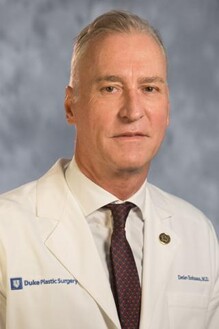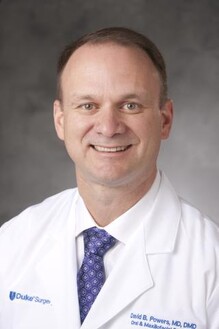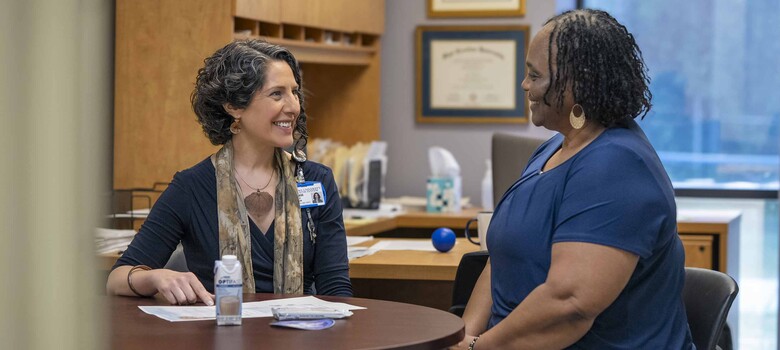Advanced Jaw Surgery Relieves Pain in Cancer Survivor of 10+ Years
Oral and Plastic Surgeons Team Up to Reconstruct Jawbone of Raleigh Man
Roger Floyd poses for a photo in a park near his home in Raleigh.
After an oral cancer diagnosis in 2010, Raleigh resident Roger Floyd was relieved when his cancer was cured. Ten years later, however, doctors discovered that his jawbone was deteriorating -- a rare side effect of the radiation therapy used to treat his cancer. Duke oral and plastic surgeons performed complex surgery to replace Floyd’s jaw using bone from his leg and a customized titanium plate. Six weeks later, most people couldn’t even tell Floyd had undergone surgery.
“I like to say that I don't look like what I've been through,” Floyd joked. “The surgical lines are barely detectable. If someone looked at me face-to-face, they would never know. I'm so grateful."
Rare Side Effect of Cancer Treatment Damages Jaw
Roger Floyd has had to advocate for his health over the years. After two biopsies failed to detect cancer on his tongue, he sought a second opinion. He was diagnosed with a common type of oral cancer called squamous cell carcinoma. Fortunately, the cancer was easily removed with surgery, and Floyd opted to have follow-up radiation therapy to destroy any remaining cancer cells.
Years later, he began having dental problems that caused excruciating pain. Various treatments and surgeries didn’t help, so again, Floyd sought a second opinion.
In January 2021, Floyd, now 69, was referred to Benjamin Hechler, MD, DDS, an oral and maxillofacial surgeon at Duke University Hospital. When Dr. Hechler received imaging scans of Floyd’s jaw -- also called a mandible -- he arranged to see Floyd the next day. Floyd had osteoradionecrosis, meaning his jawbone was dying as a result of his radiation treatment a decade earlier. It needed to be replaced and soon.
Surgery Restores Function, Relieves Pain
First, Dr. Hechler referred Floyd for hyperbaric oxygen therapy, which uses pressurized chambers to deliver high levels of oxygen to the bloodstream. This reduces pain and swelling in the injured area before surgery, helps new blood vessels form, and promotes healing after surgery.
Then Dr. Hechler teamed up with Duke plastic surgeon Detlev Erdmann, MD to create a detailed surgical plan. Guided by specialized 3D CT scans and custom cutting guides, Dr. Erdmann removed Floyd’s fibula bone -- a non-weight-bearing bone in his lower leg -- and shaped it to match the mandible. After Dr. Hechler removed about 60% of Floyd’s jawbone, he and Dr. Erdmann replaced it with a new, healthy bone along with a customized titanium plate for stability. To keep the new bone healthy and allow it to grow, they attached blood vessels from the harvested bone to vessels in Floyd’s neck. Floyd went home about six days after the eight-hour surgery.
The Healing Process
Floyd used a feeding tube for about a month after surgery to protect the surgical site. He slowly began to eat again but stuck to soft foods since most of his teeth had to be removed along with his jawbone. When he’s ready, he may receive dental implants to restore his full chewing function.
Otherwise, Floyd is back to his normal life. According to his doctors, his recovery has been exceptional. Floyd attributes that to his healthy lifestyle and positive mindset.
“I'm a very optimistic, very positive-minded person,” Floyd said. “I look at it this way: I have no control over 90% of things that happen to me, but I do have control over how I respond. That's the attitude I choose to have about things.”
Duke Experts and Resources Benefit Patients from Start to Finish
Drs. Hechler and Erdmann collaborate with a team of Duke specialists in intensive care, physical and occupational therapy, speech therapy, rehabilitation, and nutrition around 10 times a year on these types of complex jaw reconstruction surgeries.
“These microvascular reconstruction surgeries are very complex and require experts in many different fields,” said Dr. Erdmann. “And it doesn't just involve the surgery. It starts with hyperbaric therapy, when appropriate, and goes beyond surgery through recovery and then even further to dental rehabilitation as well.”
Floyd said he’s grateful for the care he has received at Duke. “My experience with Duke and the team there was second to none. Although I had major surgery, and what an experience that was, I'm so pleased.”





